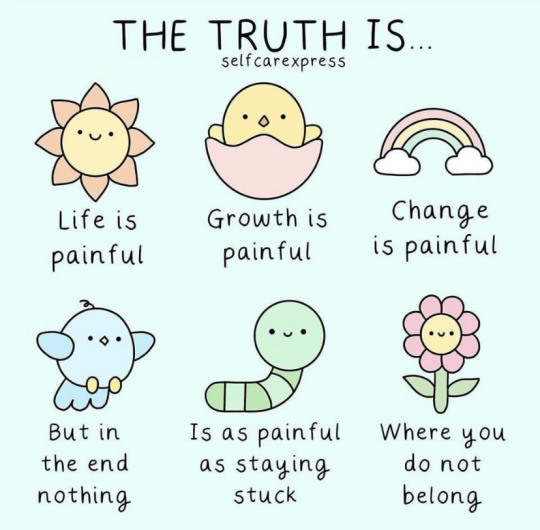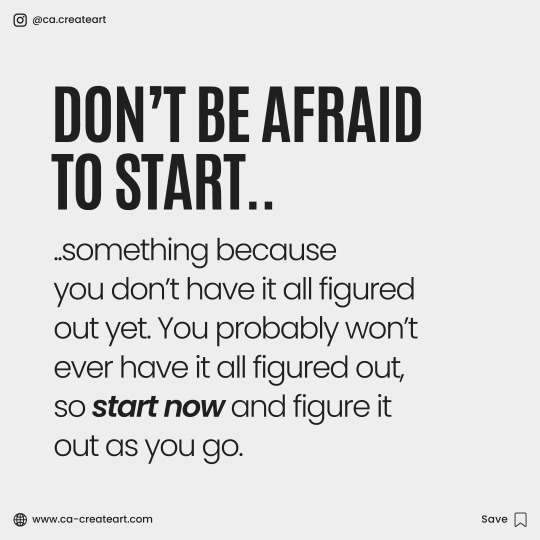Text
Très vs Trop vs Super vs Vraiment in French
Let's set the scene :
You're talking to your friend, she shows you her new art piece and you say "C'est très beau !" to say "It's so pretty !". And for a few seconds she looks a bit disappointed.
(This might sound a bit exaggerated but if a friend of mine, a native French speaker*, says "c'est très beau !" to me, I might assume that :
they're saying that ironically because it's such a strange way to say "it's so pretty !".
they think that I'm under the age of 8 and I'm bothering them - "c'est très beau, now go play with the other children")
(If your friend knows you're not French, she'll understand what you mean, don't worry)
So then, what should you say ?
First, let's take a look at "très"
1. Très // Very :
If you are writing a thesis/sending an email to French clients/talking to your boss etc…using "très" to say "very" is the way to go.
BUT we don't actually use it that much orally in the day to day life in exclamative sentences such as "It's very + adj ! "
Note 1 : Surprisingly if you want to say "It's not very + adj ! " you can still use "très".
Exemple n° 1 et 2 :
"C'est pas très bon !" // "It's not very tasty !"
"C'est pas très pratique ! " // "It's not very practical !"
In text messages or orally, whenever you want to say "It's very + adj !" I would suggest you forget about "très" and use the other expressions I'll mention in this post.
Note 2 : You cannot use the word "très" with every adjective !
- La maison est très belle. La maison est très magnifique.
- La soupe est très bonne. La soupe est très délicieuse.
[This website lists adjectives you can use to avoid saying "très". The adjectives on the left can be used with "très", the ones on the right cannot.]
2. Trop // Too :
"Trop" can be translated as "too" or "too much"
Exemple n°3 :
"Mon café est trop sucré". // "My coffee is too sweet"
BUT NOW. If we go back to our great example : Your friend shows you her art piece. A possible answer is :
"C'est trop beau !" (lit. translation :" it's too pretty").
"C'est + trop + adj ! " is a very common way to say "it's very + adj ! ".
Note 1 : It's quite informal ! Be careful whom you use it with !, (I was scolded as a child for using it)
Note 2 : This only works with the adjectives mentionned below ! If you use any other adjectives like "hot" for example : "l'eau est trop chaude" will mean that the water is too hot.
(I guess you could also think of "trop" in this context as "so")
Note 3 : "Trop" can also be used in the following structure :
"Subject + [être] + TROP + Adj"
- Beau/belle :
C'est trop beau ! // It's so pretty !
(C'est trooooop beau ! // It's soooo pretty ! )
Elles sont trop belles ! // They are so pretty !
- Cool :
C'est trop cool ! // It's so cool !
Mon chat est trop cool ! // My cat is so cool !
- Chiant : (!!!bad word alert!!!)
C'est trop chiant ! // It's so fucking annoying !
Mon frère est trop chiant. // My brother is such a pain in the ass.
- Moche :
C'est trop moche ! // It's so/very ugly !
Ce tableau est trop moche. // This painting is so/very ugly.
- Bien :
C'est trop bien ! // it's so great !
Ce film est trop bien ! // This movie is really great !
- Sympa :
C'est trop sympa de ta part ! Merci ! // It's so nice of you! Thank you!
Mes amies sont trop sympas ! // My friends are so nice !
Note 4 : Saying "c'est cool ", "c'est beau ", "c'est bien", "c'est sympa" sounds quite passive-aggressive in French.
("c'est chiant", on the other hand works perfectly on its own, don't worry)
Note 5 : Those are the most common adjectives that you can use with "trop" . I cannot think of any other adjectives but there might be some more !
The use of "Trop" is really common but informal. What should you say if you don't want to say "trop" and don't want to use "très" either ? -> You can use "super" or "vraiment"
3. Super :
You might have seen it translated as "Great".
When used in the exclamative sentence "Super !" or before a noun , it does indeed mean "great". But if it is used before an adjective, it becomes synonymous with "really" or "very"!
Exemple n°4 :
"Il fait super chaud dehors !" // It's really hot outside !
4. Vraiment :
"Super" is a bit more formal than "trop" yet if you're talking to the big boss, "vraiment" would be better.
C'est trop beau ! < C'est super beau ! < C'est vraiment beau !
Note 1 : "Vraiment" literally means "truly". Yet, I feel like in some situations we use this one in French the way English speakers use "really".
Exemple n°5 :
"C'est vraiment énervant, j'arrive pas à utiliser ce logiciel" // "It's really/truly annoying, I can't figure out how to use this computer program."
Note 2 : While "trop" and "super" are informal, you can use "vraiment" in both formal and informal settings.
Exemple n°6 :
"T'es vraiment chiant !" // "You're really/truly a pain in the ass !"
(You could also say "t'es trop chiant !" ou "t'es super chiant !")
5. A few more examples and 3 mores words to say "very"
Exemples n°7 et 8 :
"Il fait super froid dehors aujourd'hui ! " // "It's really cold outside today !"
"38 euros ? Putain, c'est super cher ! " // " 38 euros ? Fuck, that's really exprensive !"
Some people also use "méga" "archi" or "giga" to say "very " , (those 3 are informal as well)
Exemples n°9 , 10 et 11
"Il fait méga chaud dehors ! " // "It's really really hot outside !"
"J'ai archi faim !" // "I'm really really hungry"
"J'ai giga soif !" // "I'm really really really thirsty"
You can try this little test I made about this post here !
* from mainland France
390 notes
·
View notes
Text
French Slang Masterpost
Abbreviations
Slt (Salut) = Hello
Bcp (Beaucoup) = A lot
Dsl (Désolé) = Sorry
Stp (S’il te plait) = Please
Dac (D’accord) = Okay
Qd (Quand) = When
Qqch (Quelque chose) = Something
Qqn (quelqu’un) = Somebody
Internet words
Mdr (Mort de rire) = Lol
Ptdr (Pété de rire) = Lmao
Vdm (Vie de merde) = Fuck my life
Tg (T’as gueule) = Shut up
BG (Beau gosse) = Hot guy
Tkt (T’inquiête) = Don’t worry
Common sayings
Bref = In short
Ouais = Yeah
Putain, Merde = Shit
C’est de la merde = It’s crap
Ça craint = It sucks
Ça me soûle = It’s annoying me
C’est relou (C’est lourd) = It sucks
C’est ouf (C’est fou) = It’s crazy
C’est trop cool = It’s awesome
C’est le bordel = It’s a mess
Je suis claqué = I’m exhausted
Je me casse = I’m getting out of here
Je m’en fou = I don’t care
Tu rigoles = You’re jocking
Tu te fous de ma gueule = You’re kidding me
Tu fais quoi? = What’s up?
Laisse tomber = Just forget it
Fais gaffe = Be careful
Péter un plomb = Going crazy
Avoir la flemme de faire quelque chose = To be too lazy to do something
Unformal verbs
Bouffer = To eat
Taffer = To work
Roupiller, Pioncer = To sleep
Kiffer = To have a crush on someone
Etre vénère (Etre énervé) = To be annoyed
Se marrer = To laugh
Unformal nouns
Un mec = A guy
Une meuf = A girl
Un pote = A friend
Une bagnole = A car
Une baraque = A house
Un pieu = A bed
Un bouquin = A book
Une clope = A cigarette
Le fric, le blé, le thune, l’oseille, le pognon = Money
Un flic, un keuf = A cop
Un gosse, un gamin = A kid
Un boulot, un taf, un job = A job
La fac = University
Le bahut = High school
The above phrases/words can be used in almost every informal situation, but don’t use them in your essays or in any kind of normal writing!
18K notes
·
View notes
Text
Untranslatable French words
(Be careful, these are casual expressions you can use with your friends but do NOT write them in essays!)
Putain
We use this word for literally anything: when we’re happy, amazed, annoyed, disgusted…
Examples: “C’est génial putain!”, “Putain, ça me fait chier!”, “Mais bouge-là ta caisse putain!”. We also use it in front of nouns: “Cette putain de machine”
Ouf
When something is great, amazing. It’s the “verlan” (reverse) of the word “fou”, which means crazy.
Examples: “Ce match est ouf!”, “C’est un ouf lui!”, “C’est un truc de ouf!”
We also use it when something bad or scary happened but we finally made it, it’s a word of relief.
Examples: “Ouf, on s’en est sorti!”, “Ouf, on a eu chaud”
De ouf
This expression uses the same words as before but means something different. We use “de ouf” to mean that something is extra, too much. It’s usually a reply to agree with someone.
Examples: “- Il était tellement bourré hier soir! - De ouf!”
La flemme
The closer translation to “avoir la flemme” would be “to be lazy”. But I don’t think that there is any word in English that comes close to the concept of “flemme”. You can have “la flemme” to do basically anything.
Examples: “ -Tu viens à la soirée ce soir? -Non, j’ai trop la flemme” , “J’ai la flemme de la faire la vaisselle”
Ras-le-bol
It literally means “at the edge of the bowl”, we use this expression when we’re over something, when we can’t stand it anymore, when it’s annoying us. It can be used for a thing or for a person.
Examples: “J’en ai ras-le-bol de mes voisins”, “J’en ai ras-le-bol de répéter tout le temps la même chose”
Flâner
Probably the only word of this list which is not a slang but actually a word that you would find in books and that you can use in essays etc. “Flâner” means to walk slowly, to enjoy your time, to wander aimlessly just for the pleasure to walk and to enjoy your environment.
Example: “Elle a flâné dans les rues de Lille tout l’après-midi”, “Ils aiment flâner dans les allées du magasin”
Ringard
When something is out, when it’s not trending anymore and it’s a bit shameful to like it or wear it.
Example: “Cette chanson est trop ringarde”, “Porter des pantalons pattes d’eph c’est ringard”
Relou
This is the “verlan” (reverse) of the word “lourd”, which means heavy. “Relou” means that something or someone is annoying you or that it’s boring or annoying.
Example: “Le bus a 15 minutes de retard, c’est relou”, “Ce mec est tellement relou”
Pêter un cable
To go crazy, to burn out
Example: “Si ça continue comme ça je vais péter un cable”, “Il a pété un cable au bar hier soir”
Un beauf
Someone who wears old or ridiculous clothes such as socks with flip-flops. The stereotype is that these persons are white, not very educated, live in the countryside, are quite poor, like drinking alcohol, listen to bad music, have bad hair etc… I’ll join a picture so that you can portray better what is means

The man from the picture is actually “Jeff Tuche”, a character from a popular movie in France called “Les Tuche” which is the story of a beauf family who wins the lottery.
Examples: “C’est un camping de beauf”, “Patrick Sébastien ne fait que des chansons de beauf”
Avoir le seum
To be mad, to be petty about something. We mainly use it when we’re annoyed because we lost or when we wanted something to happen but it’s not happening.
Examples: “Ma mère veut pas que je sorte ce soir, j’ai le seum”, “Les belges ont le seum d’avoir perdu contre les français”
Bric à brac
A mix of random objects
Examples: “C’est un vrai bric à brac ta voiture”, “Je n’arrive plus à retrouver mon briquet dans ce bric à brac”
And the last one: Pouloulou, it’s not a word, it’s a feeling
2K notes
·
View notes
Text
worth!
Books to read to improve your French
Hi! If you're learning French and are looking for something to read, here's a list of books I read and loved as a French pupil that you might want to discover!
Beginners (A2-B1)
Tistou Les Pouces Verts, by Maurice Druon: This is the story of Tistou, a child who can make flowers sprout wherever his hand lands. Tistou uses his power to help adults around him to bear the difficult aspects of life, such as war and sadness. As it is a kid book, it is quite easy to read and full of vocabulary (especially for learning the names of flowers!)
The Laure and Compagnie series, by Catherine Missonier: This series of five books recount the eccentric adventures of elementary school pupils. The stories are all very funny (ranging from a class discovering that their teacher is a secret agent to a story about an alien who turns into a human and lands in a fifth-grade classroom)
Intermediate (B1)
Le Petit Prince, by Antoine de Saint-Exupéry: You may already be familiar with this book, as it is widely known. It tells the story of a little boy traveling from planet to planet in the universe looking for a place to settle. It is a very touching philosophical tale and by far my favorite book on this list.
Le Petit Nicolas, by René Goscinny: Nicolas is a boy living in France in the 50s. He writes about his daily life in post-war France, his relationship with his friends, with school, and his parents. I loved these books as a child. They are easy to read and very useful for learning about French society in the 20th century.
Intermediate-Advanced (B2)
Le Château de ma Mère and La Gloire de mon Père, by Marcel Pagnol: these two novels are autobiographical. The author recounts his youth in Provence. The author's style is simple to understand, but his stories are moving and give the impression of falling back into childhood.
Advanced (C1)
La Passe-Miroir, by Christelle Dabos: La Passe-Miroir is a series of French fantasy novels. Ophelia, a young woman living on the planet Anima, can tell the history of objects just by touching them. Her story begins when she gets engaged against her will to Thorn, a mysterious man from a frozen planet...
La Parure, Aux Champs and Le Horla, by Guy de Maupassant : Maupassant is one of France's most famous authors of short stories. I discovered those three in high school, and I really liked them because of their unexpected endings. These texts are short, but Maupassant lived in the 19th century, so his style is a bit more difficult to understand.
Voyage au Centre de la Terre, by Jules Verne (or, really, anything by Jules Verne): I think I must have read this book at least fifty times and I'm still not tired of it ;-)! Verne narrates the story of Axel and his uncle, Professor Lidenbrock, who, one day, find a map that might be able to lead them to the center of the Earth... The story is fascinating and the characters are quite endearing. However, there is a lot of scientific jargon that might be difficult to understand without a dictionary.
Hope these suggestions can help you find something to read!
Plum
2K notes
·
View notes
Text
french songs you should listen to
Nouvelle-Orléans - La Femme
Bleu Fuschia - Odezenne
New York - Radio Elvis
Le confort - Voyou
Toutes les machines ont un cœur - Maëlle
Delta - Odezenne
Si un jour - La Femme
Hanöi Café - Blue Toucan
Toi et Moi - Paradis
Vitesse - Napkey
Maintenant ou Jamais - Catastrophe
Coma Idyllique - Foé
Margot dansait sur moi - Terre Noire
La poussière- Automelodi
Petit à Petit - Arcadian
Ça va - Émile Bilodeau
Magie - Bon Enfant
Potager - LaF
Tangerine - LaF
Écoute Cherie - Vendredi sur mer
All songs from “Fréro Delavega”
251 notes
·
View notes
Text
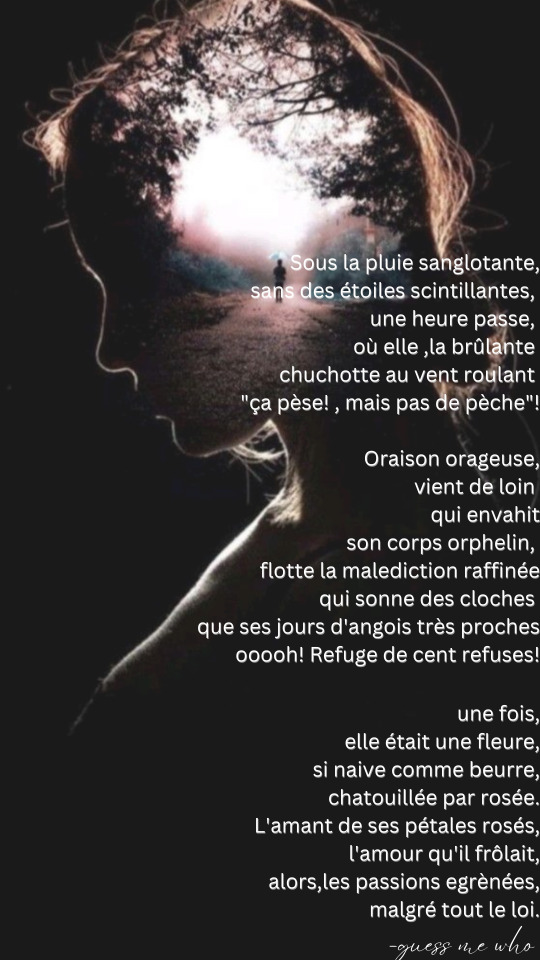
le féminisme peut être coloré de différentes couleurs avec des milliers de reflets différents pour des millions d'yeux. Voici mes réflexions sur un côté fatal des femmes. Passez simplement vos lèvres sur les lignes et laissez-moi entendre vos pensées et voir votre réaction sur ce petit poème.
0 notes
Text
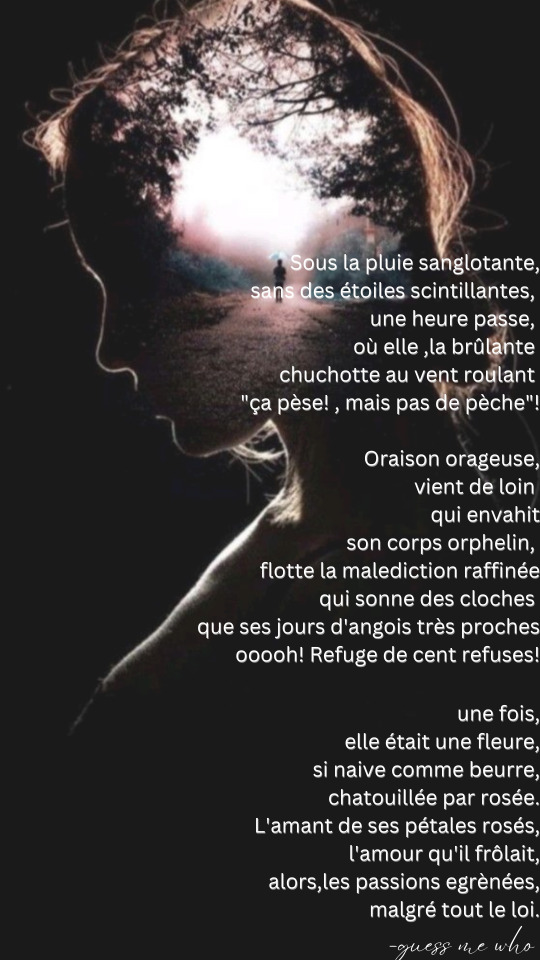
Le féminisme peut être coloré de différentes couleurs avec des milliers de reflets différents pour des millions d'yeux. Voici mes réflexions sur un côté fatal des femmes. Passez simplement vos lèvres sur les lignes et laissez-moi entendre vos pensées et voir votre réaction sur ce petit poème. Je remercie tous ceux qui laissent un commentaire ou une réaction à cette creation car chaque commentaire est important et une grande inspiration pour cette petite ecrivaine.
1 note
·
View note
Text
Langblr reactivation challenge - week 2 day 2
Okay, for the grammar rule, I'm going to go with the conditional past in French. This post assumes that you have some knowledge of the Perfect tense and conditional present, but if not or you need a refresher, follow those links.
The conditional past is when someone could have, would have, should have done something. A quick example: Si j'aurais su que tu allais au supermarché, je t'aurais demandé d'acheter du lait. If I would have known that you were going to the supermarket, I would have asked you to buy some milk.
This tense is a combination of the conditional present and the perfect tense.
The tense uses the conjugation of either avoir or être in the conditional present tense as the auxiliary verb followed by the past participle used in the perfect tense.
Present tense conjugations of avoir and être (which are used as the auxiliary verb in the perfect tense):
J'ai / je suis
Tu as / es
Elle a / est
nous avons /sommes
vous avez / êtes
ils ont / sont
For the perfect tense the order for simple sentences is pronoun-auxillary verb-past participle i.e. Elle a porté une robe - she was wearing a dress
Present conditional conjugations of avoir and être (which are used as the auxiliary verb in the conditional past):
J'aurais / serais
Tu aurais / serais
Il/elle aurait / serait
Nous aurions / serions
Vous auriez / seriez
Ils/elles auraient / seraient
The order for simple sentences is the same, pronoun-auxillary verb-past participle i.e. Elle aurait porté une robe - she would have worn a dress
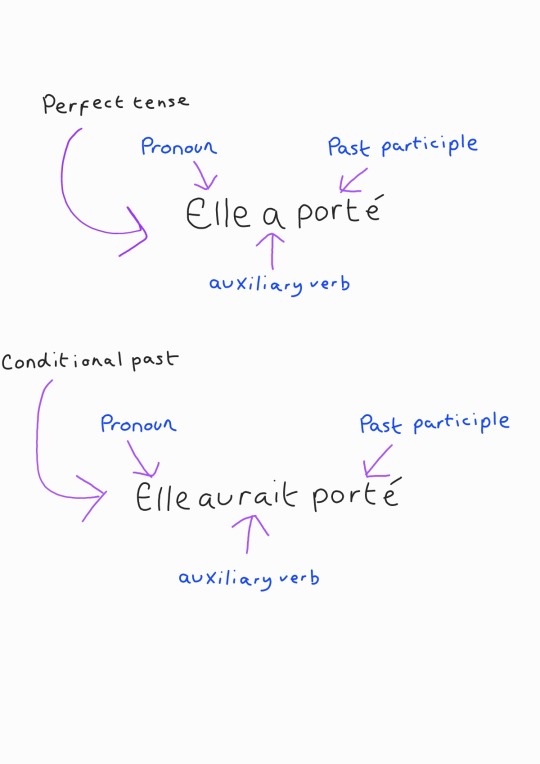
The perfect tense vs conditional past
J'ai regardé la télé - I watched the tv
J'aurais regardé la télé - I would have watched the tv
Tu as joué au foot - You played football
Tu aurais joué au foot - You would have played football
As in the perfect tense, the verbs which take être (such as aller, devenir, sortir) as the auxillary verb will take être in the conditional past, (and the past participle will need to agree with gender and number!)
Il est allé au cinéma - he went to the cinema
Il serait allé au cinéma - he would have gone to the cinema
Elles sont allées au cinéma - They went to the cinema
Elles seraient allées au cinéma - They would have gone to the cinema
Then there is could (pouvoir) and should (devoir)
The past participle of pouvoir is pu and devoir is dû
For simple sentences the order is pronoun-auxillary verb-past participle-infinitive
The infinitive is simply the verb before being conjugated, i.e. aller, devenir, faire etc.
J'aurais pu acheter un chat - I could have bought a cat
J'aurais dû faire mes devoirs - I should have done my homework
An in context example is found in this song:
youtube
A couple of sentences in the chorus:
J'aurais dû crier crier, désolée - I should have shouted (shouted) sorry
J'aurais dû arracher ta chemise - I should have torn off your shirt
That brings us to the end of this quick guide! I hope this can be helpful to someone <3
48 notes
·
View notes
Text
“Every day may not be good… but there is something good in every day.”
— Unknown
547 notes
·
View notes
Text
“Accept that some days you’re the pigeon, and some days you’re the statue.”
— Unknown
321 notes
·
View notes
Text
“They say a person needs just three things to be truly happy in this world: Someone to love, something to do, and something to hope for.”
— Tom Bodett
2K notes
·
View notes

